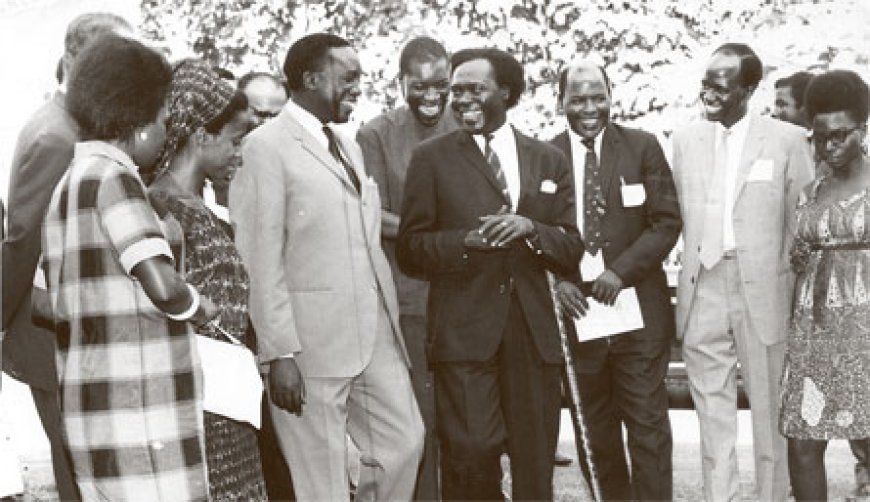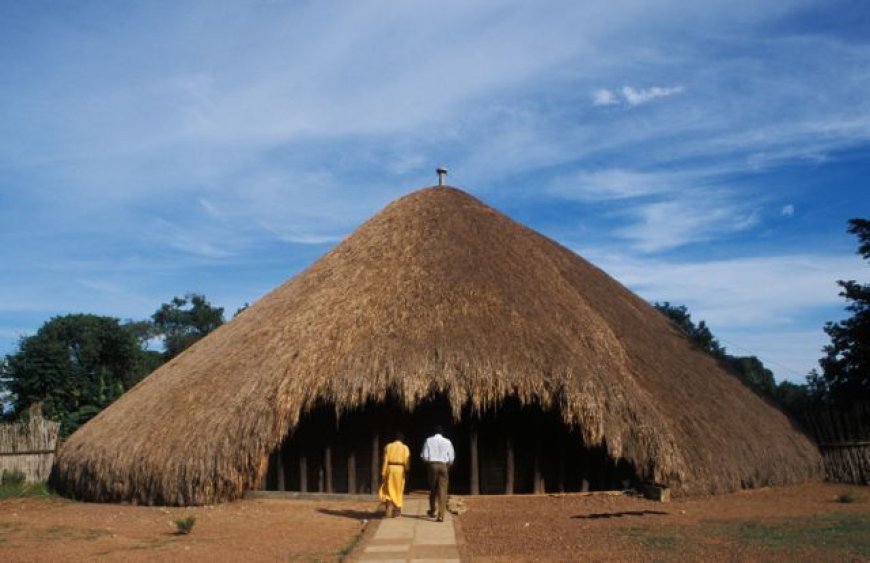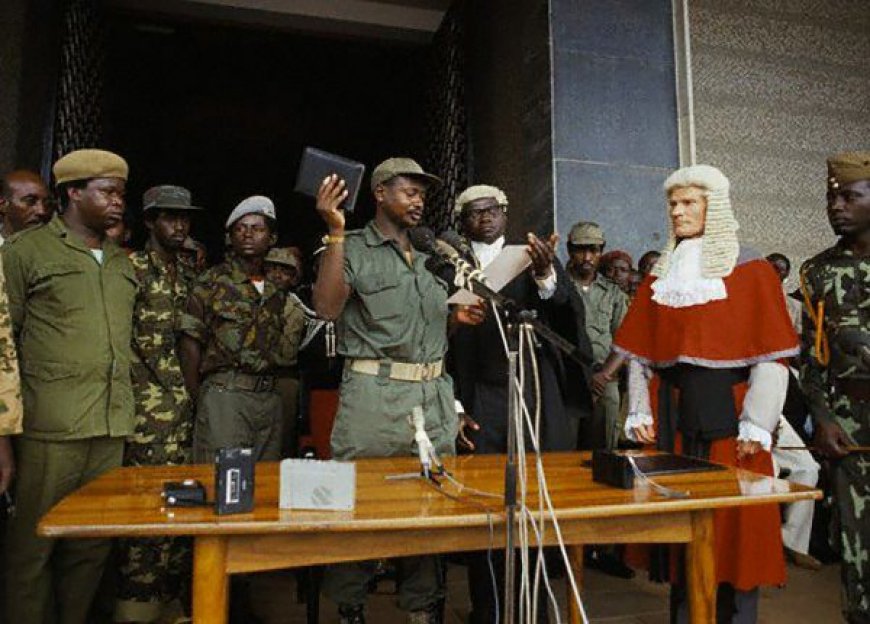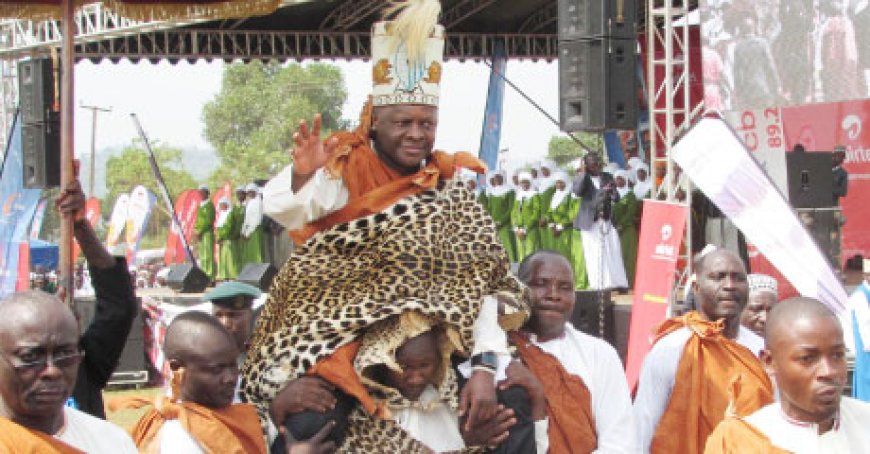Tracing Kabaka Ronald Muwenda Mutebi’s Remarkable Journey Leading to His Historic Coronation
It should be noted that events surrounding the 1966 Mengo Crisis, had included the suspension and abrogation of the Independence Constitution a ‘pigeon hole’ law on April 15th, 1966.

The story leading up to the Kabaka, Ronald Muwenda Mutebi II momentous occasion began many years earlier, dating all the way back to 1956.
This journey to the throne was one of resilience, tradition, and deep-rooted heritage. Born in 1956, Kabaka, Ronald Muwenda Mutebi II was destined to inherit the esteemed title, yet his path to kingship was not without challenges. Throughout the years, he displayed remarkable leadership qualities and a profound understanding of his people's needs.
On April 3, 1992, the National Resistance Army Council chaired by Lt Gen Yoweri Museveni, sitting in Gulu resolved the decision to return traditional rule which was abolished by Obote during his rule.

In this meeting it was agreed that all properties that were confiscated by the Obote government in 1966 when it abolished traditional institutions should be returned to the owners.
This was the symbolic and long-awaited clearance that the Buganda Kingdom had longed for to kick-start the journey to make Prince Ronald Mutebi as the 36th king.
July 24, 1993 was hereafter earmarked as a date for the coronation until the “Pigeon hole” constitution- still operational by then, hit blow to the entire arrangement.
“Panic engulfed the organisation of the coronation with Article 118 still in place,” recalls Mzee Kayongo Male, one of the architects of the 1993 coronation.
Article 118(1) of the new law, stated thus: “The institution of king or ruler of a kingdom or Constitutional Head of a district, by whatever name called, existing immediately before the commencement of this Constitution under the law then in force, is hereby abolished.”
The NRC government equally passed the Traditional Rulers Restitution and Properties Statute - which guaranteed the return of the kingdom property.
“From 1989 when we commenced preparations for the coronation, there was always fierce resistance from individuals like, among others, the now runway spymaster, David Tinyefunza, Dr Kizza Besigye and Maj Gen Mugisha Muntu,” Mzee Kayongo recalls.
He adds: “The realisation of that day in 1993 was preceded by a journey full of sacrifices, patience, backstabbing (from all fronts) and resilience.”
In a book titled- Shaping the Society Christianity and Culture by Pastor Stephen Kyeyune, on August 6, 1956, Kabaka Edward Fredrick Muteesa II, named Prince Mutebi II as the heir, and a will was assented to before his trusted witnesses; I.T.M Sewanyana, Musa K. Parma Ntanda and Robert H. Ntambi Mukasa, in London.
Mutebi is one of Muteesa’s nine children born to Namasole Kabejja Sarah Kisosonkole (RIP) and he is said to have been one-year-old when his father made the will.
According to historical facts at Ugandans at Heart website by K.I. Luts, Muteesa’s will was translated into English on March 3, 1970 by Andrew Frederick Mpanga, who was living in London, with the approval of the then Katikkiro, Joash Mayanja Nkangi.
“Edward Frederick William David Walugembe Mutebi Luwangula Muteesa II of Mengo: This is my will, which I am making in the event of my demise when the Lord pleases to take me away from this world,” Muteesa wrote.
“My child Ronald Frederick Muwenda Mutebi is my heir whom I have chosen to succeed me (to succeed to my Mutuba).”
He, however, clarified that although he was well aware that succession to the throne is decided through election by the Lukiiko, in his will, he wanted to indicate his wish to his people.
“The prince, enumerated in the following order, should be considered first for election: My heir, Ronald Muwenda Mutebi.
Prince Mutebi’s first hand to the throne started with the performing of norm of covering of his father’s body with a bark cloth in 1971 after President Idi Amin allowed the return of his remains from London where he died in 1969.
He was thereafter installed as the head of the Royal Clans ‘‘Ssabataka” in 1971.
It is noted that Gen. Yoweri Kaguta Museveni betwwen 1981 and 1986 during the Bush War as the guerilla commander, met Prince Mutebi, who was then living in London.
At NRA bush headquarters in Luweero District, in an arrangement made by John Nagenda a Senior Presidential Adviser on media who passed on in March 2023.
This arrangement was aimed at gaining support for the NRA in the Buganda region.
It is said that the two similarly held three separate meetings in Masaka, Kilembe and Kabale to conjure the return of monarchism though no formal documents were made between the two.
Some Baganda elders including Omutaka Grace Musoke and renowned city lawyer John Katende, pushed for the return of the prince from London where he was staying, which the President acquiesced in August immediately after the NRA Bush War in January 1986.
In 1992, President Museveni inaugurated discussions between his government and Buganda Kingdom to decide on what possessions to return, when and how.

According to Mzee Kayongo , in December 1992, Baganda loyalists led by some clan leaders marched through the streets of Kampala as a sign of appreciation to the NRA government for the decision to return the kingdom’s property like cultural sites ordinarily indicated as “ebyaffe”.
Prof Apollo Nsibambi, then minister of Public Service, and Jehoash Mayanja Nkangi, the then Buganda Katikkiro among other leaders later concentrated on demanding for most of its property in the subsequent years and a task force led by, among others, concentrated on demanding for most the Buganda properties.
Eventually, July, 31, 1993 was there chosen as the day for the coronation of king of Buganda Ronald Muwenda Mutebi II at Naggalabi in Wakiso District.

It should be noted that events surrounding the 1966 Mengo Crisis, had included the suspension and abrogation of the Independence Constitution a ‘pigeon hole’ law on April 15th, 1966.
“Described by Prof. Tarsis B. Kabwegyere as ‘hushed’ and without debate, declared; “…it is hereby resolved that the constitution that came into being on the 9th day of October 1962 be abolished and it is hereby abolished accordingly and the constitution now before us to be adopted and it hereby adopted this day, 15th April 1966.”
https://twitter.com/DailyMonitor/status/237504371603148800
With that declaration and Buganda’s king exiled to Britain, open anger and criticism towards the Milton Obote government especially in Buganda.
What's Your Reaction?

















































































